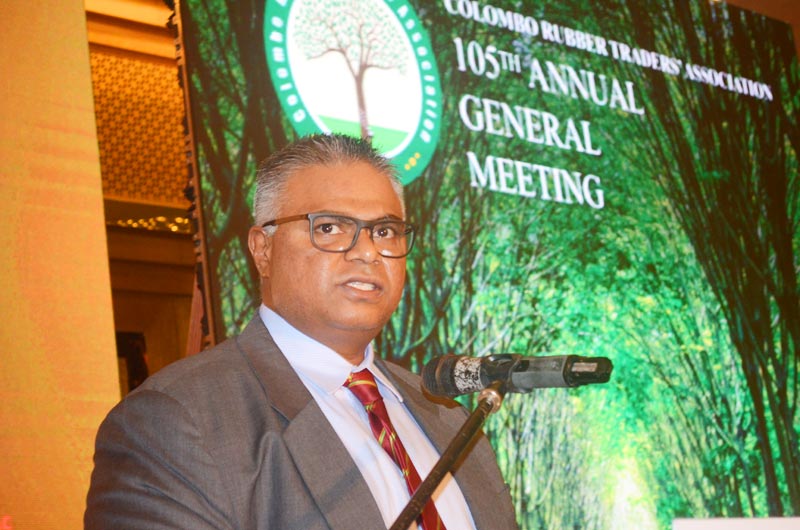Thursday Feb 19, 2026
Thursday Feb 19, 2026
Monday, 15 July 2024 02:57 - - {{hitsCtrl.values.hits}}

Colombo Rubber Traders’ Association President Harin de Silva
By Charumini de Silva
The Colombo Rubber Traders’ Association (CRTA) President Harin de Silva voiced major concerns regarding the proposed daily wage increase to Rs. 1,700 for plantation industry workers and the pressing need for sustainable solutions to ensure the long-term health and competitiveness of Sri Lanka’s rubber industry amidst evolving global standards and local economic challenges.
Speaking at the Post-Business Session of the 105th Annual General Meeting of the CRTA last Friday, de Silva highlighted that the proposed wage hike would be ‘financially unsustainable’ for the industry, already strained by various challenges.
“The CRTA acknowledges the importance of fair wages for our workers, but the proposed increase to Rs. 1,700 is financially unsustainable for the plantation industry,” he said.
The proposed 70% wage increase, he argued, would likely result in reduced investments, job losses and a decrease in global competitiveness.
He noted that the rubber industry has been grappling with erratic weather patterns, diseases and reduced profit margins, stressing that the wage increase would exacerbate these issues.
“The CRTA has urged the Government to collaborate with industry stakeholders to develop a sustainable wage system based on productivity that balances the use of workers amidst the economic realities of the industry,” he stated.
He said the CRTA believes that a sustainable wage model is essential for the long-term health of the industry.
“It is crucial for the Government to collaborate with industry stakeholders to devise a sustainable solution for the benefit of our workers and the industry’s future. The CRTA is dedicated to supporting agents and enhancing working conditions within the sector and is committed to engaging in constructive dialogue with the Government and relevant stakeholders to achieve these objectives,” he added.
Another critical topic discussed was the European Union’s deforestation regulation (EUDR), set to take effect on 1 January 2025.
“This regulation requires exporters of natural rubber to provide geo-location data for harvested rubber and a statement confirming compliance with sustainable practices,” de Silva said, warning that non-compliance could severely impact Sri Lanka’s ability to export natural rubber to Europe, which would be detrimental to the industry.
As a direct beneficiary of the EU GSP+ concessions, Sri Lanka’s rubber exports to the EU market will have to adopt due diligence to prove that products do not originate from recently deforested land or have contributed to forest degradation.
The EU adopted the EUDR in June 2023, to ensure that agricultural products consumed by EU citizens do not contribute to global deforestation or forest degradation. The regulation will apply to the production of commodities like cattle, wood, cocoa, soy, palm oil, coffee, rubber, and their derived products.
“The CRTA has conducted several awareness sessions on EUDR and has been involved in many committees and protocols to facilitate the implementation of these regulations,” he said, adding that the association has appointed consultants to ensure compliance.
He also noted that given the short timeframe, the Government and related agencies needed to support the companies to comply with the regulations before the end of 2024.
The CRTA President also addressed the significant decline in the country’s natural rubber production, which has fallen from 152,100 tons in 2012 to 64,450 tons in 2023. “This reflects a decline of around 58% over the last 11 years, and production is expected to drop further in 2024. Sri Lanka exports around 24,000 metric tons of natural rubber, contributing to a value-added product worth over $ 1 billion,” he said.
However, he pointed out that the current decline affects about 40,000 tons of low-priced, non-competitive natural rubber used in value-added activities.
“The annual demand for the natural rubber industry in Sri Lanka is around 130,000 tons, but local production has fallen short. This shortfall of 90,000 tons is compensated by imports from other natural rubber-producing regions in Southeast Asia and East Africa. The industry, which is losing valuable foreign exchange, cannot afford to undermine the importance of natural rubber, risking the marginalisation of Sri Lanka’s natural rubber sector,” de Silva stressed.
He highlighted the severe impact of the circular leaf spot disease (CLSD), which has decimated rubber plantations in Sri Lanka since its first identification in 2019.
“Over 70% of plantations managed by regional plantation companies are affected, leading to a significant threat to the sustainability of these plantations. The disease has resulted in reduced yields and increased costs for smallholders and regional plantation companies,” he stressed, amidst the climate change patterns.
The CRTA Chief said the withdrawal of Government subsidy schemes for planting new rubber lands and replanting old ones has further exacerbated the industry’s struggles.
He emphasised the need for Government support to reinstate these subsidies and help the industry recover.
Despite these challenges, the CRTA remains committed to supporting the industry and improving working conditions.
The newly elected CRTA President called for constructive dialogue with the Government and relevant stakeholders to find viable solutions that support both workers and the industry’s future.
“The CRTA is committed to represent the interests of the rubber industry in Sri Lanka,” he said
As the apex organisation, the CRTA comprises companies engaged in selling, broking and buying natural rubber produced in Sri Lanka, and is committed to expanding the trade and obtaining the optimum prices in the global market, thereby successfully sustaining the Sri Lankan rubber industry.
- Pic by Shehan Gunasekara